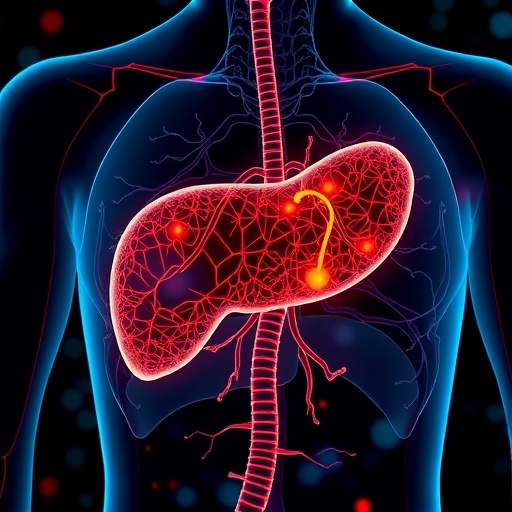A groundbreaking study carried out by a team of researchers led by Li et al. has revealed a significant advancement in the realm of medical technology, particularly in predicting the risk of hepatocellular carcinoma (HCC) for patients dealing with HBV-related compensated advanced chronic liver disease (CACLD). Utilizing cutting-edge machine learning methodologies, this team has developed a risk prediction model that promises to enhance patient outcomes significantly and streamline treatment strategies.
The genesis of this research comes at a critical time as liver cancer rates continue to escalate globally, predominantly due to chronic viral infections such as hepatitis B virus (HBV). Current diagnostic practices often rely on invasive methods, which can be painful and risky for patients. The advent of artificial intelligence-driven approaches offers a promising alternative to mitigate these challenges. Through sophisticated algorithms, machine learning can analyze complex datasets and identify patterns that may elude traditional analytical methods.
The researchers meticulously gathered a robust dataset comprising clinical, demographic, and laboratory information from numerous patients diagnosed with HBV-related CACLD. They employed advanced machine learning techniques to train their model, ensuring it could accurately process multifactorial inputs. By feeding the system a substantial volume of historical data, including outcomes from various treatment paradigms, they refined their prediction capabilities, rendering them capable of anticipating the onset of HCC with remarkable precision.
One of the standout features of this model is its ability to adapt and learn from new information over time. This inherent flexibility is paramount in the medical field, where patient conditions can fluctuate, and new treatments emerge. Implementing continuous learning mechanisms allows the model to remain relevant and improve its accuracy as additional data becomes available, thereby providing healthcare professionals with an ever-evolving tool for risk assessment.
In developing the predictive model, Li and colleagues scrutinized various risk factors, including liver function parameters and previous patient histories. By employing advanced feature selection techniques, they identified the most significant variables that correlate with HCC development. This not only optimizes the predictive accuracy but also equips physicians with the insights needed to make informed decisions about a patient’s treatment plan.
The researchers recognized the importance of validating their model to ensure its clinical applicability. They divided their dataset into training and testing sets, ensuring that the model’s performance could withstand rigorous scrutiny. By subjecting the tool to cross-validation methods, they assessed its robustness and reliability in predicting real-world patient outcomes. Through this validation, they demonstrated that their model outperformed existing predictive benchmarks, representing a substantial leap forward in hepatology.
Furthermore, the implications of this predictive model extend beyond mere risk assessment. By identifying patients at high risk for HCC, clinicians can implement tailored surveillance strategies and therapeutic interventions earlier than previously feasible. This proactive approach not only has the potential to save lives but can also alleviate the economic burden associated with late-stage cancer treatments and hospitalizations.
The study’s findings are exceptionally promising, positioning machine learning as an integral facet of modern medicine. As healthcare systems around the globe grapple with the complexities of chronic diseases, integrating predictive analytics into clinical frameworks offers a diverse range of benefits. This model aligns with a broader trend of utilizing technology to enhance precision medicine, whereby patient care is customized based on individual risk profiles and health data.
Moreover, the research underscores the increasing importance of interdisciplinary collaboration in advancing medical science. The integration of expertise from computer science, data analytics, and clinical medicine is essential in pushing the boundaries of what is achievable. In fostering collaboration across these fields, the future of healthcare can harness innovations that were once thought unattainable.
As this machine learning-based prediction model for HCC gains traction, there is an expectation that it could pave the way for similar advancements in other areas of cancer research. The principles of predictive analytics may be adapted to develop risk assessment tools for various malignancies, potentially revolutionizing how healthcare providers approach cancer surveillance and prevention.
Nevertheless, while the promise of this research is substantial, it is critical to remember that technological solutions must be implemented alongside comprehensive clinical evaluations. The effective utilization of this predictive tool requires clinicians to interpret findings within the larger context of patient care. Ensuring that healthcare professionals are equipped with the right training and support will be vital in maximizing the potential benefits of machine learning applications in oncological settings.
This study exemplifies a significant stride toward integrating advanced computational techniques with clinical practices, offering hope for improved patient outcomes in hepatology. As the model progresses through stages of real-world testing, the medical community eagerly anticipates the tangible benefits it could bring to HCC risk stratification.
In conclusion, the research by Li, Qiao, Li et al. serves as an impressive testament to the transformative power of machine learning in healthcare. It not only highlights the potential for innovation in cancer risk prediction but also signals a shift towards precision and personalized medicine that could redefine patient management in the coming years.
Subject of Research: Machine learning-based risk prediction model for hepatocellular carcinoma in patients with HBV-related compensated advanced chronic liver disease.
Article Title: Machine learning-based hepatocellular carcinoma risk prediction model for patients with HBV-related compensated advanced chronic liver disease.
Article References:
Li, Y., Qiao, Z., Li, Y. et al. Machine learning-based hepatocellular carcinoma risk prediction model for patients with HBV-related compensated advanced chronic liver disease.
J Cancer Res Clin Oncol 151, 285 (2025). https://doi.org/10.1007/s00432-025-06345-0
Image Credits: AI Generated
DOI: 10.1007/s00432-025-06345-0
Keywords: machine learning, hepatocellular carcinoma, hepatitis B virus, risk prediction, chronic liver disease.
Tags: advanced chronic liver disease predictionAI liver cancer risk predictionartificial intelligence in oncologychronic liver disease managementdata-driven healthcare solutionsHBV-related liver diseasehepatitis B virus impact on liver cancerhepatocellular carcinoma risk modelmachine learning in healthcarenon-invasive cancer diagnostic methodspatient outcome improvement strategiespredictive analytics in medicine





